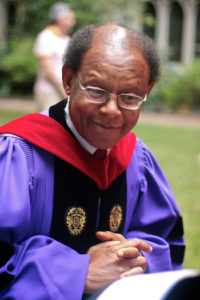
James Cone
*James Cone was born on this date in 1936. He was a Black theologian who advocated Black Theology and liberation theology.
James Hal Cone was born in Fordyce, Arkansas, and grew up in Bearden, Arkansas. He and his family attended Macedonia African Methodist Episcopal Church. He received a BA from Philander Smith College in 1958, a B.D. earned a degree from Garrett-Evangelical Theological Seminary in 1961 and an MA and Ph.D. from Northwestern University in 1963 and 1965, respectively.
He taught theology and religion at Philander Smith College, Adrian College in Michigan, beginning in 1970 at Union Theological Seminary in New York City, where he was awarded the distinguished Charles A. Briggs Chair in systematic theology in 1977. Cone's theology also received significant inspiration from a frustration with the Black struggle for civil rights; he felt that Black Christians in North America should not follow the "White Church" because it was a willing part of the system that had oppressed black people.
Accordingly, his theology was heavily influenced by Malcolm X and the Black Power Movement. Martin Luther King Jr. was also an important influence; Cone describes King as a liberation theologian before the phrase existed. His 1969 book Black Theology and Black Power provided a new way to define the distinctiveness of theology in the black church. Cone’s work was influential from the book's publication and remains influential today. His work has been utilized and critiqued inside and outside the Black theological community.
His methodology for answering the questions raised by the African American experience is a return to Scripture, particularly to the liberated elements such as the Exodus-Sinai and the life of Jesus. However, Scripture is not the only source that shapes his theology. In response to criticism from other black theologians (including his brother, Cecil), Cone began to make greater use of resources native to the African American Christian community for his theological work, including slave spirituals, the blues, and the writings of prominent Black thinkers such as David Walker, Henry McNeal Turner, and W. E. B. Du Bois.
Cone was not entirely focused on ethnicity: "Being black in America has little to do with skin color. Being black means that your heart, your soul, your mind, and your body are where the dispossessed are." (Black Theology and Black Power, p. 151) humanity is whole, and cannot be isolated into racial and national groups. In his 1998 essay "White Theology Revisited," Cone retained his earlier strong critique of the White church and white man for ignoring or failing to address the problem of race.
Womanist theologians, such as Delores Williams, have critiqued Cone for both male-centered languages and for not including the experiences of black women in his sources. Williams, in 1993, acknowledged in a footnote in her book Sisters in the Wilderness that Cone had modified exclusive language for reprinting his works and acknowledged the issues with the previous language. However, she argues that he did not use the experiences of African American women in his method and, therefore, still needed to deal with the sexism of his work. Other critiques of Cone's theological positions focused on the need to rely more heavily on sources reflecting the black experience in general, on Cone's lack of emphasis on reconciliation within the context of liberation, and his ideas of God and theodicy.
Aspects of Cone's theology were controversial in the political context of the 2008 US presidential campaign as Jeremiah Wright, at that time pastor of then-candidate Barack Obama, noted that Cone's theology had inspired him. Some scholars of Black theology noted that controversial quotes by Wright may not necessarily represent Black theology.
Cone responded to these alleged controversial comments by noting that he was generally writing about historic white churches and denominations that did nothing to oppose slavery and segregation rather than any white individual. Cone was the Charles Augustus Briggs Distinguished Professor of Systematic Theology at Union Theological Seminary in the City of New York until his death. He and his wife had two sons and two daughters. James Hal Cone died on April 28, 2018.